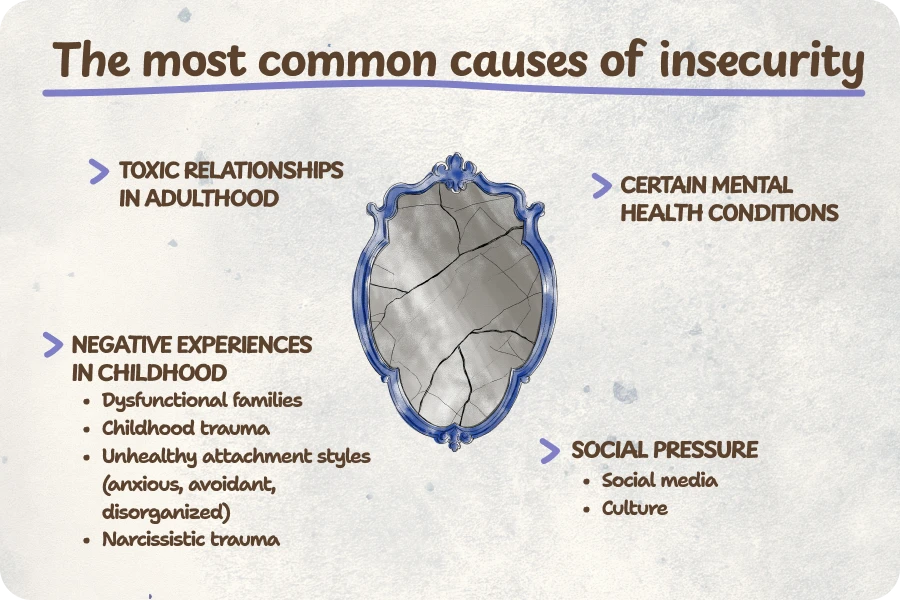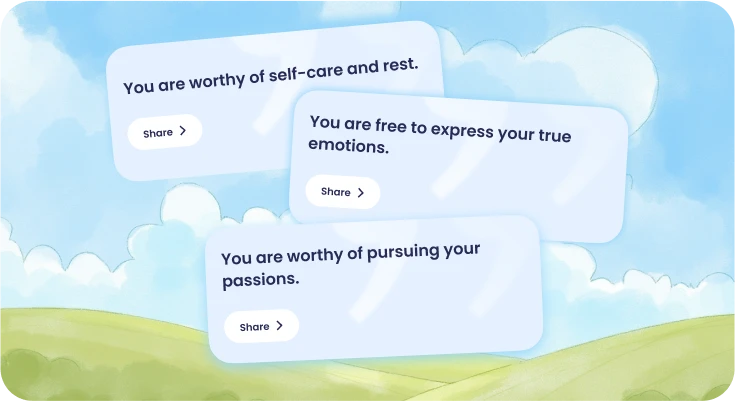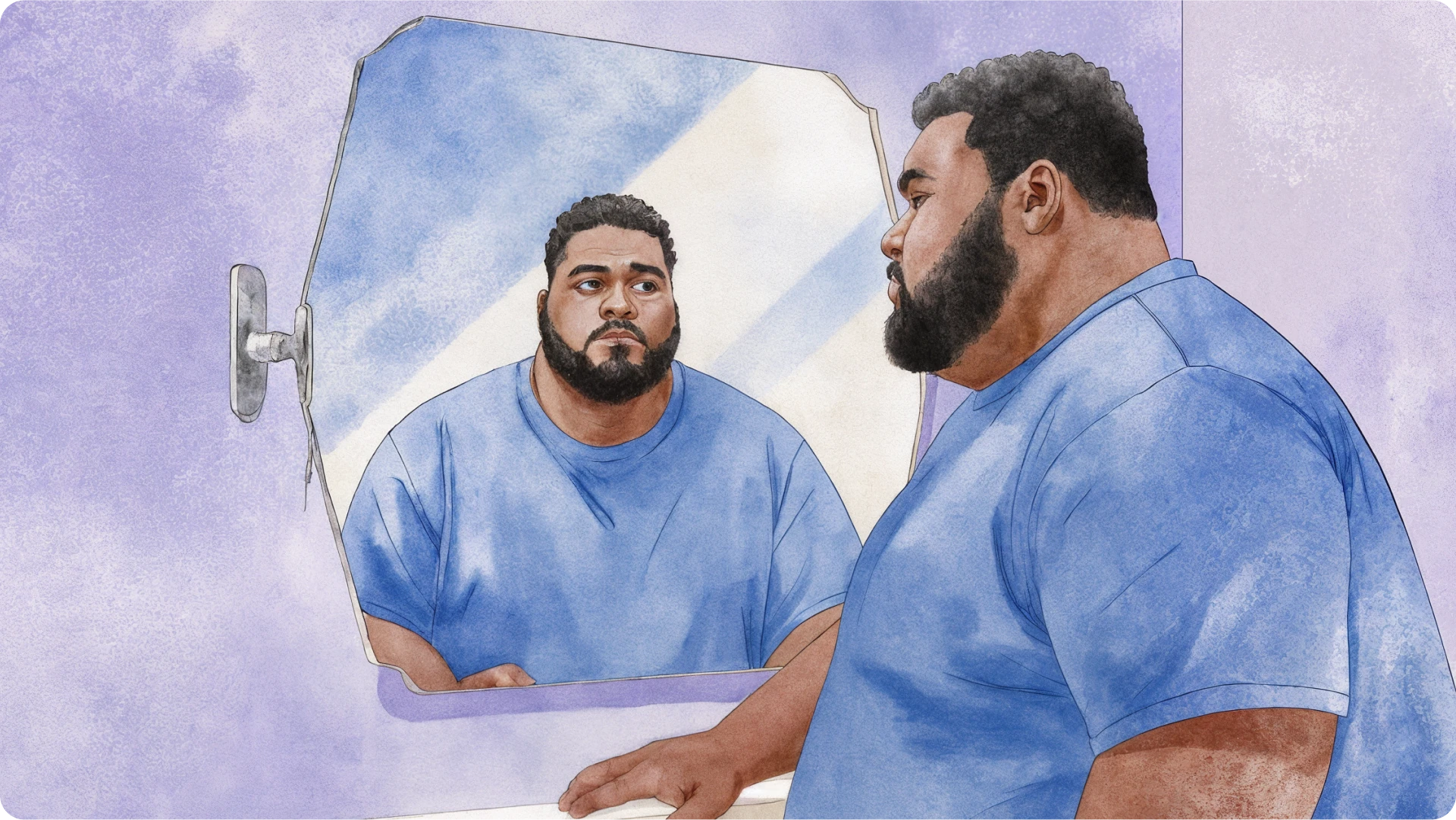Insecurity is something everybody experiences from time to time, but not everybody likes to admit it. Although feeling insecure is totally normal, wondering “Why am I so insecure?” all the time can stem from childhood experiences, stress, perfectionism, and even certain people.
In this article, we’ll explore deeper reasons why you can feel insecure and learn how to overcome insecurity with profound methods and daily tips that will boost your confidence.
The reason why you are so insecure can be as simple as your well-being. Stress and major life events can make us more vulnerable. Complete this free well-being test and learn how to overcome insecurity.
What Does It Mean to Feel Insecure?
Feeling insecure means being uncertain about your abilities, looks, goals, and even your place in the world. On average, a person can have a few insecurities (e.g., appearance, tastes, life circumstances).
Insecurity is not a diagnosis itself because it’s a temporary state. It can be a symptom of other states or mental health conditions, but where else does insecurity come from?
- Negative experiences in childhood
- Dysfunctional families
- Childhood trauma
- Unhealthy attachment styles (anxious, avoidant, disorganized)
- Narcissistic trauma
- Social pressure
- Social media
- Culture
- Toxic relationships in adulthood
- Certain mental health conditions
Insecurity Definition in Psychology
American Psychological Association (APA) defines insecurity as a feeling of inadequacy, lack of self-confidence, and inability to cope. But feeling insecure can also include:
- Low self-esteem
- Fear of rejection
- Inability to accept failures and mistakes
- Social anxiety (social withdrawal as a consequence of anxiety or insecurity)
- Perfectionism
- Fear of being vulnerable
- Thinking that everybody constantly judges or discusses you behind your back
- Negative self-talk
Expert Insight
“Healthy self-awareness is curious, compassionate, and aimed at growth—it helps someone understand their patterns and make choices aligned with their values. Destructive self-doubt, on the other hand, carries a harsh or critical tone. Rather than insight, destructive self-doubt leads to paralysis, shame, or avoidance. When reflection becomes a form of self-attack instead of self-understanding, that’s the point where self-awareness has crossed into self-doubt.”
Rychel Johnson
Mental health professional
Insecurity vs. Low Self-Esteem
Insecurity doesn’t appear in every area of life. For example, a person may be insecure about their laughter or music tastes, but otherwise feel self-confident. Having low self-esteem, on the other hand, means that a person doesn’t experience self-confidence.
Although used interchangeably, insecurity and low self-esteem have distinct differences, summarized in the table:
| Aspect | Insecurity | Low Self-Esteem |
| Definition | A situational feeling of doubt or uncertainty in specific areas (e.g., skills, looks, relationships). | A general negative self-view that affects identity. |
| Where it presents | Depending on the context, usually under triggering circumstances (e.g., at a beach if a person has body insecurity) | All aspects of life: school, work, achievements, hobbies, relationships, etc. |
| Duration | Usually a temporary feeling that disappears when the circumstances change or shortly after. | More constant and long-term, rooted in early experiences or mental health conditions. |
| Impact | May cause discomfort and fear of specific situations. Can be avoidable. | Shapes most aspects of life. |
Impact of Unaddressed Constant Insecurity
If not addressed, feelings of insecurity slowly spread to other areas of your life and, therefore, jeopardize mental health. Let’s take a closer look at what unaddressed insecurities can lead to:
- Higher chances of anxiety and depression. Constant negative thoughts are proven to change brain chemistry and structure that eventually lead to diverse mental health conditions [1].
- Physical issues. The same reason as for the previous point. Stress, associated with negative thoughts, alters key processes in the brain that can make people more susceptible to heart diseases, obesity, diabetes, and digestive problems.
- Eating disorders. Insecurities about physical appearances are the most common ones to lead to disordered eating. People, especially women, can feel so much pressure that they would intentionally follow dangerous diets or fast.
- Problems in relationships. Constant self-doubt, associated with insecurity, makes people question the motives of others. They might not trust their loved ones because they may blindly believe they aren’t worthy of love. Due to this, conflicts arise, partners can’t communicate healthily, and trust issues develop.
- Professional stagnation. Overthinking prevents us from trying new opportunities because of the fear of potential failure. Absence of change = stagnation = no professional growth.
Studies on adolescents show that those with higher emotional intelligence are less likely to experience insecurity-related anxiety due to better emotional regulation [2]. Check if low emotional intelligence can be a reason you were feeling unconfident recently.
5 Main Signs of Insecurity
Insecurity symptoms that check out for most people are self-doubt, comparing other people’s achievements and failures to you, overthinking, perfectionism and fear of failure, and overconfidence.
Never-Ending Self-Doubt
Self-doubt in insecurity feels like having a critic inside your head. This critic has a nagging voice that tells you everything you do is not good enough. It can be hard to catch these negative beliefs in action because of how automated they become.
Self-doubt leads people to be conscious of every single detail of themselves. The way they stand, how they look, everything, all of a sudden, is important. For them, everything good said about them is a lie or out of politeness.
What’s even worse, people who doubt their abilities do not take new opportunities. Why would they? In their racing minds, they have already tried it and even failed. The imagined feelings are so painful and humiliating that they would never allow something like this to happen in real life.
Comparison with Others is on Autopilot
Comparison to others may become so subtle and routine that a person with certain insecurities no longer notices them. But it’s exactly when it becomes dangerous — when a person doesn’t even understand what is wrong about their negative thoughts.
Because of constant comparisons, an insecure person can’t help but feel inferior. They might feel as though they don’t belong. If they are surrounded by confident, smart, funny, and friendly people, they may feel there is no space for them to be confident.
Overthinking as Protection
Think of it as your brain trying to protect you from bad outcomes. However, in insecure people, overthinking turns into a habit of automatically assuming bad intent.
It comes from a cognitive mistake known as negativity bias, which occurs because the human brain is simply more sensitive to negative stimuli [3]. Once, negativity bias was a protective mechanism because if we expect a threat, we are better prepared for it.
One dangerous fact about overthinking is that it becomes a habit. Repeated negative thoughts and paralysis of analysis, in turn, physically alter brain structure and reduce the levels of mood-regulating neurotransmitters, like serotonin and dopamine [1].
To prevent insecurity from growing into mental health conditions, you can try evidence-based mental health approaches, such as journaling, mood tracking, affirmations, or meditation. All are available in the Breeze Wellbeing app.
Perfectionism to Gain Back Control
The Perfectionism Social Disconnection Model (PSDM) claims that people believe they won’t be rejected if they are “perfect.” Being perfect also gives them a sense of control to set the highest standards for themselves (even if they are not achievable).
Ultimately, if a person strives to be or believes they are perfect, they would expect others to see them the same way. Therefore, the most confident, smart people can be sensitive to criticism, which points to underlying insecurity.
Compensatory Overconfidence
Although we imagine insecure people as reserved, shy people who rarely speak in public, the most easy-going, confident people you know can also doubt their abilities. Sensitivity to rejection + perfectionism = overconfidence.
Some people with insecure thoughts cannot accept anything besides compliments and approval. That’s why they may strive to be the smartest, the prettiest, the most athletic, and the most confident, even if they don’t feel that way inside.
Some may even turn to quick, but harmful ways to combat their feelings of inadequacy, like gossiping or criticizing others. People who constantly feel inferior will desperately look for an easy way to feel superior, even at the cost of putting others down.
P.S. Important to note that the signs of an insecure woman often differ from those of an insecure man. Some societies have different demands on men and women. For example, men might be more likely to be insecure about their financial state, strength, and emotionality. Meanwhile, signs of an insecure woman include fear of being left alone, not having a family, not being feminine enough, etc.
Why Am I So Insecure? Common Causes
Insecurity usually comes from overthinking, self-doubt, and the absence of healthy coping skills. These factors develop in childhood, but social pressure, negative experiences from romantic/platonic relationships, and certain mental health conditions can also contribute to insecurities in adult life.
You Experienced Something Negative in Childhood
Research supports that attachment to parents or caregivers in childhood develops “internal working models” which we use as templates for our self-worth [4]. Let’s look into where childhood insecurity may come from:
- Overbearing parenting. Children of parents who are too involved in the lives of their children just to take “better care” of them can grow with lower general self-esteem and various insecurities.
Due to constant control and involvement, a child internalizes the belief that they can never get anything right. Hence, they won’t try because they are sure to fail.
- Narcissistic trauma. It’s the consequence of abuse from people with narcissistic traits. Usually, children with narcissistic trauma get it from their parents, more rarely siblings, teachers, friends, or other family members. Self-perception and self-worth are going to be the first targets of narcissistic family members.
Parents who are insecure themselves can impose their perfectionistic views on their children. Not only do such parents punish, criticize, and compare, but they generally don’t show love and support when their offspring make mistakes. These unrealistic standards, caused by insecurities, continue to persist in the next generation.
- Toxic/dysfunctional household. Incarcerated family members, loss, substance use, abuse, lack of boundaries, etc. Many things create a “dysfunctional” household, but if you generally felt unsafe or uncomfortable being home, a place where you are supposed to relax and unmask, there is a higher likelihood that you may have insecurities.
Growing up in such a family, children feel like their parents are never there for them. This can create an illusion that the problems/needs of children are unimportant. Still, a child can try to “earn” love by getting good grades or taking care of siblings. Neither leads to positive internal working models, but both lead to decreased self-esteem.
Childhood trauma (emotional, sexual, physical abuse, and neglect) is even more likely to trigger insecurity mechanisms. One study found that up to 77% of people who had negative experiences in childhood develop symptoms of depression and anxiety as a result of damaged self-esteem [5].
You Compare Yourself to Others
Social conditioning occurs when people from an early age are taught to behave and think in certain ways to fit in. Social comparison theory suggests that behaving like others in ancient societies was essential for survival.
Initially, the ability to compare ourselves with other fellow humans helped us to evaluate our abilities more precisely and even to self-improve. Knowing our strengths and weaknesses in collectivistic societies increased our chances of survival.
Nowadays, comparison brings more negativity than inspiration or self-improvement. It happens primarily due to the digital age, especially social media, where everybody is “successful and beautiful”.
However, this is a cognitive mistake: people are unlikely to show their problems or drawbacks on Instagram. It can contribute to the development of insecurity because a person starts to wonder, What is wrong with me.

You Were/Are in Toxic Relationships
As long as we communicate our needs and can be vulnerable with other people, occasional rejection is not critical. Insecurity appears when relationships are either toxic or one of the partners, friends has an unhealthy attachment style.
What is very damaging for self-esteem is relationships with a narcissist. Narcissists oftentimes have insecurities themselves. That’s why they tend to put others down. To boost their ego.
A difficult part about relationship insecurity is gaslighting. Narcissistic relatives, partners, and friends are not trustworthy. But they also make you believe that you cannot trust yourself.
It May Stem from Certain Mental Health Conditions
Understanding where insecurity comes from is impossible without consideration of depression, which feeds on feelings of inadequacy and perceived flaws. Due to changes in neurochemistry, a person with depression may struggle to find something good in their life, blaming themselves for it. They may believe they are worthless, but they can’t do anything about it.
Anxiety has a lot of common signs with insecurity: overthinking, paralysis of analysis, perfectionism, comparison, social anxiety, etc. Sometimes anxiety contributes to insecurity by strengthening negative beliefs and avoiding situations that could potentially prove them both wrong.
What other conditions can cause insecurity:
- Cluster “B” mental health conditions and bipolar disorder cause severe self-perception distortions during depressive and manic episodes.
- PTSD and cPTSD can give general insecurity and hopelessness, caused by “internal working models,” the very same templates people form in childhood.
- Eating disorders, such as anorexia or bulimia, distort a person’s view of their physical appearance, making them insecure about certain body parts, places, or people.
Step-by-Step Strategies on How to Overcome Insecurity
Overcoming insecurity always comes down to setting boundaries, building confidence, and prioritizing your needs and well-being. Below are some evidence-based strategies plus concrete steps you can take to make them work.
Practice Self-Compassion
It’s easy to say just be kind to yourself. But if you let your inner critic put you down for years, it won’t be easy to get rid of it. You have to start small:
- Treat yourself. Buy yourself a coffee you consider overpriced. Take a bath, you’ve been dreaming about the last two weeks. Feelings of insecurity force us to believe that we are not worthy of anything good. It’s not true because we are in control of what we deserve.
- Journal. It’s so easy to forget how strong we are in the daily hustle. Meanwhile, your insecurities tell you that you are not good enough, you work, manage family, work on yourself, all while looking fabulous. The journaling feature in the Breeze app is an excellent option for beginners because of its customized prompts.

- Imagine you as a child. People are usually kinder to children than they are to themselves. That’s why a working method to silence your inner critic is to imagine yourself as a child. Talk to them, ask them about their dreams, tell them about your achievements. That’s how you see how far you’ve come.
Challenge Negative Thoughts
Go the safe way to overcome insecurity first: the cognitive reframing technique. It’s used in Cognitive-Behavioral Therapy (CBT). Here’s how you do it with an example:
- Describe a situation in which you felt worthless or insecure.
Example: My friends were actively discussing something, and I wanted to contribute, but they kept interrupting me until I shut down until the end of the evening.
- What emotions did you feel?
Anger, shame, insecurity, isolation.
- What were your automatic negative thoughts?
- What I wanted to say was not important, and my contribution wouldn’t support a discussion.
- If I interrupt others, they might think I’m needy and that my ideas are not worth stopping the whole conversation.
- What are rational arguments for these thoughts?
- Someone may indeed not like to be interrupted.
- My contribution may not be interesting to others.
- What are rational arguments against these thoughts?
- My friends discussed different topics, some of which were important and some were not. The “importance” of ideas is subjective.
- In a friendly meeting, not everything said should be important. We are here to have fun and talk.
- It’s normal for people in heated conversations to interrupt each other.
- Even if nobody liked my idea, they’d eventually get over it.
- How will you adapt your thoughts based on the rational arguments above?
- Even if my idea didn’t bring anything new to the conversation, it’s okay, I’m here to have fun, not to bring value.
- My friends will love me even if I say something wrong or make a mistake.
Give Yourself Positive Feedback
How come that we can go into spirals about our insecurities, but not about our exceptional abilities? Seek validation within yourself; you don’t need others to praise you. Even if nothing comes to mind, try this:
- Be specific about what you did well. No “Great job today at the gym” or “I was so productive today.” Break things down to the smallest details: “Today at the gym, I lifted more than last time. I also did cardio for 20 minutes after the workout. And I also helped another person adjust the machine. Good job!”
- Try affirmations. Struggling to think of something positive about yourself may be challenging after years of feeling insecure. Breeze’s in-app affirmations are designed not only to stimulate the reward center of the brain and make you feel good, but also to motivate you to take care of yourself in the future.

- Accept the praise of others. Even if you believe this is just small talk or they’re just trying to be nice, accept it with a simple “thank you”. Think about it: a person could hesitate at first to compliment you, but something about you struck them so hard, they had to share it with you.
Less Comparison, More Focus on Your Feelings
Try to understand that everybody is on their unique path to personal growth. If other people achieve something, and you still deal with past situations, it’s okay. Their success doesn’t mean your loss. There is plenty of space for everyone to be successful and have achievable goals.
If you’re still on your way to self-acceptance, limit social media for good. You can unfollow unrealistic bloggers or people triggering your insecurities.
Consider Therapy
Therapy is the most essential step on the personal growth journey. It provides a personalized space to explore the root causes of your insecurities. A professional will make sure to explore your past, relationships, and culture to untangle the reason behind your self-consciousness.
Expert Insight
“The best type of therapy depends on the source and pattern of a person’s insecurity. For example, if self-doubt stems from harsh inner criticism or perfectionism, CBT can help challenge distorted thoughts and build balanced self-talk. If insecurity is rooted in early attachment wounds or relational patterns, psychodynamic or attachment-based therapy may be more effective. Those struggling with deep shame or trauma may benefit from Internal Family Systems (IFS) or EMDR. But don’t worry about deciding what approach you could use–a skilled therapist will help identify the approach that fits best with your needs and goals.”
Rychel Johnson
Mental health professional
FAQ
Frequently asked questions
What is the root cause of insecurity?
Most people develop insecurities because of negative experiences in childhood. When parents neglect a child’s needs and feelings, their attachment “templates” teach them that they are not important. However, different insecurities can develop in adulthood, for example, after toxic relationships or because of cultural pressure.
Can insecurity be healed?
Insecurity is not a mental health condition, so it cannot be healed. But it can be a symptom of certain mental health influences. People can overcome insecurity and problems with self-esteem. A profound inner work should be done: therapy, journaling, affirmations, and self-compassion are the most common strategies.
Why am I so insecure all of a sudden?
It’s okay to feel insecure sometimes. These feelings can be a response to stressful events, lack of sleep, or perfectionism. If you’re not used to feeling insecure, try to explore what it means to you. And don’t forget not to be harsh on yourself.
How do I stop overthinking and insecurity?
To end overthinking cycles, consider using the cognitive reframing technique from CBT. At first, describe a situation and the negative automatic thoughts you had. Then, think about rational arguments for and against these thoughts. Finally, describe what adapted thoughts would sound like based on rational arguments.
What is the biggest insecurity in women and men?
Although signs of an insecure woman vs. a man can differ, every person has their own insecurities regardless of gender. The most common insecurities usually concern physical appearance, finances, social support, relationships, and personal tastes.
Sources
- Heekyeong Park, Rayus Kuplicki, Martin P Paulus, Salvador M Guinjoan. Rumination and Over-Recruitment of Cognitive Control Circuits in Depression. Biological Psychiatry: Cognitive Neuroscience and Neuroimaging. August 2025.
- Abhishek Saini, Komal Tyagi. A Study of the Relationship between Emotional Intelligence and Anxiety among High School and Intermediate Students. The International Journal of Indian Psychology. April–June 2025.
- John T. Cacioppo, Stephanie Cacioppo, Jackie K. Gollan. The negativity bias: Conceptualization, quantification, and individual differences. Cambridge University Press. June 2014.
- Jude Cassidy, Jason D Jones, Phillip R Shaver. Contributions of Attachment Theory and Research: A Framework for Future Research, Translation, and Policy. Development And Psychopathology. November 2014.
- Anouk W Gathier, Lonneke A van Tuijl, Brenda Penninx, Peter J de Jong, Patricia C van Oppen, Christiaan H Vinkers, Josine E Verhoeven. The role of explicit and implicit self-esteem in the relationship between childhood trauma and adult depression and anxiety. Journal of Affective Disorders. June 2024.
Disclaimer
This article is for general informative and self-discovery purposes only. It should not replace expert guidance from professionals.
Any action you take in response to the information in this article, whether directly or indirectly, is solely your responsibility and is done at your own risk. Breeze content team and its mental health experts disclaim any liability, loss, or risk, personal, professional, or otherwise, which may result from the use and/or application of any content.
Always consult your doctor or other certified health practitioner with any medical questions or concerns
Breeze articles exclusively cite trusted sources, such as academic research institutions and medical associations, including research and studies from PubMed, ResearchGate, or similar databases. Examine our subject-matter editors and editorial process to see how we verify facts and maintain the accuracy, reliability, and trustworthiness of our material.
Was this article helpful?







